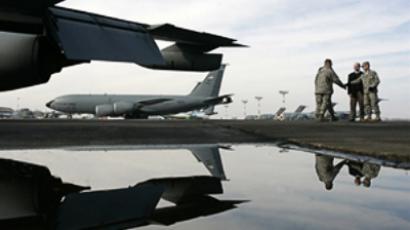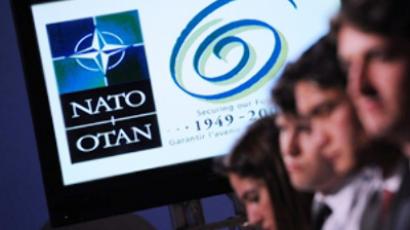Does Obama recycle George W. Bush’s plans?
What are the perspectives of NATO expansion? Is U.S. policy in Afghanistan escalating the war in the region?
To discuss this and much more, RT interviews Professor Noam Chomsky, political activist, philosopher, and author.
RT: Professor Chomsky, thank you very much for joining us today. You said that president Obama is simply recycling Bush’s plans when it comes to bank reform, and not getting to the heart of the problem. What do you mean by that?
Noam Chomsky: The essence of the Obama – Gartner program is not all that different from the Bush – Paulsen programs, and it has been pointed out by plenty of leading specialists.
They point out quite accurately that these programs’ basic principle is to preserve the institutions intact, whereas to deal with the problem you have to modify the institutions. In my view – considerably, but in his view, a conservative revision. So, break up the banks, give up the insurance policy which is called “too big to fail” which is not an insurance policy and permits, in fact encourages, the big banks to take very risky investments and make huge profits. This happens repeatedly. We need real institutional changes, but the principle of the Bush – Paulsen – Obama – Summers plan is to keep the institutions intact without change and try to get them over their current difficulties, and then go on to keep them alive, and then let them maintain their fundamental structure intact.
RT: Doesn't this go against everything that Obama promised about changing and fixing Washington?
N.C.: Elections in the US are essentially run by the public relations industry which manages elections. They sell candidates the way they sell toothpaste on TV. Think of the circumstances during the election, and imagine yourself as an advertising executive. You have a country where about 80% of the population thinks it is going the wrong way, thinks the government does not work for us. It works for a few looking out for themselves. Of course, you are going to make your slogan “Change of hope and unity." And a crucial difference in the campaign was that the financial industries which are the major funders preferred Obama to McCain, so he was far better funded by the financial industries since neo-liberalism has become overwhelmingly important in the US and the world in fact. So yes, they were brought in to fix up the crisis they created. And of course, they are going to fix it up so the institutional structures remain the same.
RT: What you are describing doesn't necessarily sound like a democracy, like a functioning healthy democracy?
N.C.: This is not a functional healthy democracy. In fact there is a very substantial split, a gap actually, between public opinion and public policy on a great many issues. So take for example the leading domestic issue for decades, it's been the healthcare system. And the healthcare system is catastrophic, and that hurts people. When your mother is dying in hospital, and you cannot pay for it.
For decades, a large majority of the public is interested in a national healthcare system the other industrial countries have. And the same thing is true for international issues. For decades, there have been polls, and a large majority said we have to normalize relations with Cuba. But it is just not on the political agenda, it has no political support in common terminology. The public has opinions on that. A large majority of the public, probably 75%, think we have to end threats against Iran, believe that Iran should have the right to develop nuclear energy like any signer of non-proliferation treaties, but of course, not nuclear weapons. And the similar majority is in favor of a nuclear weapons-free zone in the entire region including Iran, Israel, and any US forces deployed there. It's just not on the agenda.
RT: What do you make of the small steps that president Obama has taken so far with attempting to diplomatically engage Iran?
N.C.: He is highly praised for his new year's address to the Iranian people which was respectful. But the core of his message was we are willing to accept you into the civilized world, but first you have to meet your responsibilities. You have to abandon arms and violence. Suppose someone from Mars is watching it. Here is a country which invaded and occupied two countries on the borders of Iran, spends as much on the military as the rest of the world combined, and has an incredible record of violence and aggression. On the other hand is Iran, with a military budget approximately the same as Kuwait, has not invaded anyone in a couple of hundred years. And the leader of the superpower with the armaments in inauguration and invasion is telling Iran that you have to drop arms and violence. Well, you know the Iranian regime is not a nice regime, there's plenty to criticize, but this comparison is so dramatic, it takes a genious not to perceive it, and it was not perceived. That is the indication of the depths of imperial ideology. That is just an implicit belief that we fundamentally own the world and if anyone is in our way, they're doing something wrong.
RT: Can we argue with the US ambitions of putting a missile defense systeme up in Eastern Europe, essentially in Russia's backyard, and proceeding to expand NATO, even though Russia was promised that NATO would not expand one inch east after the Soviet Union fell apart?
N.C.: Recently more documentation has come out and it's interesting. When they said NATO would not expand to the east, they were talking about East Germany. That East Germany would not be fully incorporated into NATO, which is from the Russian point of view fully understandable after Russia had war with Germany two times during one century. 'Ok, we won’t expand NATO fully to East Germany,' and furthermore they were promised that NATO would become a kind of political alliance not a military alliance, and nobody was even talking about bringing east European countries into NATO. Well, as soon as Clinton came in, he arrogated that, and expanded to the east, Bush was more aggressive. What about the missile defence? Well, first of all, on both sides strategic analysts understand that missile defense is a first strike weapon. Even if it works technically, it is not going to stop a first strike. It could conceivably threaten a retaliatory strike, so in effect, it's a first strike weapon. So now why put it in eastern Europe? If the pretense is to stop an Iranian missile, first of all Iran didn't have missiles, and if it did, the chances of its using one are less than the chances of asteroids hitting the Earth. No Iranian leader unless they're insane is going to say 'ok, wipe ourselves off the map,' because that's what would happen. It's not to stop an Iranian missile, it's to illuminate a potential Iranian determination to attack. So now, why put it up near the Russian border, instead of down south – you suggest it. It's telling the Russians you're under threat too. And these are highly aggressive positions, and again, they're over the objections of the population. In the Czech Republic, the majority is opposed to it, but its government backs the US, and is pushing it forward.
RT: Let's stay on international issues. The G20 summit recently took place in early April. President Obama made his international debut as president of the US. Obviously, the global economic crisis was priority number one, but Obama was also discussing Afghanistan. He was really trying to garner support from NATO members to help the US out, as the US continues, and plans to continue, their efforts in Afghanistan. What do you make of the current plans the US has for the war in Afghanistan?
N.C.: I think it's a serious mistake. Bush started escalating the war in Afghanistan in 2004, and Obama in his campaign said that he's not going to escalate it further, and in fact he is. He's actually sending tens of thousands of troops, expanding attacks. They have killed a couple of Al-Qaeda members, but it's mostly civilian, and it's pretty much the same in Afghanistan. In fact, the president of Afghanistan, actually they have a president, his first message was stop the attacks that are killing the civilians. As far as I know, this message was not even answered. The president Karzai also called for a timetable for a withdrawal of armed troops, I don't think that was answered. What has happened is that Karzai, who used to be a media darling, they loved his clothes and everything else, has become kind of a bad guy who has to be dismissed – we don't like him anymore, and if he makes statements like that, he's not a favourite anymore, and in effect, there are plans apparently to replace and kick him upstairs, and put him in a kind of proconsul to run the country and do what we say. Now there's a substantial Afghan peace movement who were calling for an end of violence, a reconciliation among Afghans. We're happy to have you here, but for reconstruction, and stop killing, stop fighting, the attacks which just increase resistance. Militarily, the US can surely put down any resistance, it has overwhelming military power, but not socially and politically.














